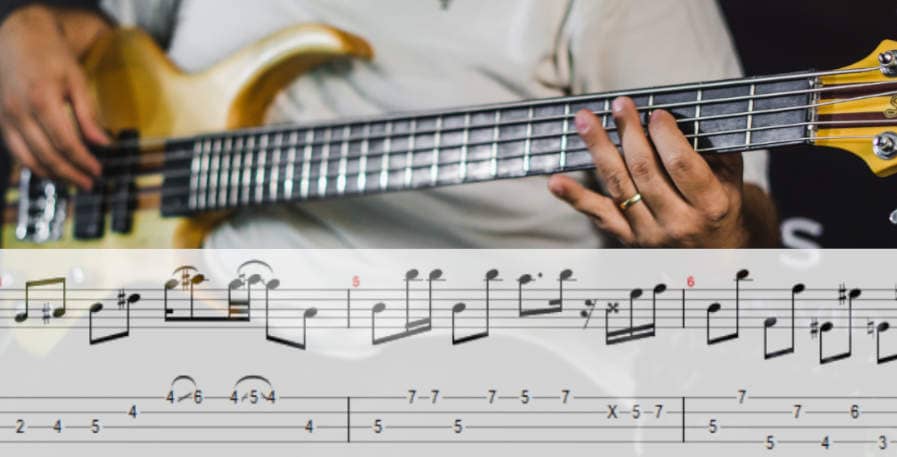Given how simple many basslines are, hard bass tabs can be difficult to come by. Once you know where to look though, you will find that there are many challenging songs to choose from.
That`s why I`ve compiled this list of some of the hardest bass tabs I know of. These are great for advanced or intermediate bass players to test their skills and to see how far they’ve come as bassists.
The songs listed are in various genres, tempos, and range from difficult to borderline impossible. The majority of them can also be played on a 4-string bass tuned to E standard. Because of this, you will find at least a couple of hard bass tabs on this list that will suit your style and skill level.
Also, do not be discouraged if any of these songs feel too difficult to play. The bass is a difficult instrument to play at a high level, and these songs are meant to be a challenge for experienced bass players.
11. Iron Maiden – Genghis Khan
- BPM: 120 (multiple changes to 150 and 100)
- Genre: Heavy Metal
- Tuning: E Standard
- Bass: 4-string
- Bassist: Steve Harris
Steve Harris` creative songwriting and signature metal P bass tone is the backbone of Iron Maiden`s sound. He is loud in the mix, and his melodic playing and galloping rhythms make most of his basslines hard to cover.
While there are many Maiden songs that could have made this list, “Genghis Khan” is without question among the hardest.


It starts with a rhythmic bass riff that has a fast triplet in it. This is hard to play on its own, but things only get worse as the song progresses.
Among other things, you will face multiple tempo changes, time signature changes, and melodic grooves played at 300 BPM. Thus, if you love fast and melodic heavy metal, “Genghis Khan” is the perfect challenge.
10. Brocas Helm – Cry Of The Banshee
- BPM: 160
- Genre: Power Metal
- Tuning: E Standard
- Bass: 4-string
- Bassist: Jim Schumacher
Also featured on my list of the best metal basslines ever, “Cry Of The Banshee” by Brocas Helm will test your tapping skills.
While the bassline in the verse and chorus is fairly simple, Jim Schumacher taps an insane melody during the instrumental parts:
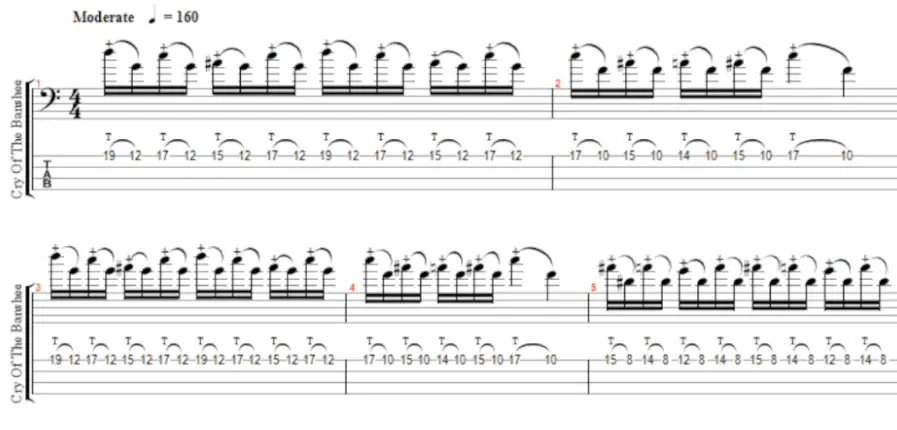

Thus, if you have some experience with tapping, this is a great song to test your speed.
If tapping isn`t your strong suit, it is better to try out a different song on this list. If you want to try a less demanding tapped bassline, check out “Broken One” by Trivium instead.
9. Rush – YYZ
- BPM: 141 (main riff), various tempo changes
- Genre: Progressive Rock
- Tuning: E standard
- Bass: 4-string
- Bassist: Geddy Lee
“YYZ” is Rush`s musicianship and songwriting at their finest. Despite their iconic “Moving Pictures” album being packed with classics, this instrumental track is among its more popular tracks.
A big reason for this is Geddy Lee`s bass tone and his technical, yet catchy grooves. While the song has multiple recognizable motifs, such as the intro and the short bass solos, the most recognizable of them is the main riff:

If you are going to learn the song, I recommend starting with that part. Not only is it fun to play, but it is a great test to see whether you can handle the rest of the song.
If you give it a try, I also recommend recording yourself playing it. Bass covers of this song are notorious for having strings ringing out, and being slightly off-tempo. This is in large part because the lines require you to jump between strings regularly at a high tempo.
Thus, being able to play it fast enough is one thing, but sounding clean while doing it is the real challenge.
8. Mudvayne – Severed
- BPM: 143
- Genre: Alternative Metal
- Tuning: Drop B
- Bass: 4-string
- Bassist: Ryan Martine
This list could very well have consisted solely of Ryan Martine’s basslines. Despite “L.D. 50” being Mudvayne`s debut album it still features some of the hardest bass tabs in all of metal.
Among these is “Severed”. The difficulty of it lies in mastering the chord usage, slides, mutes, and fast slapping. Another factor is that the bassline is relatively progressive, and the song consists of many different parts.
One of these unique parts is this bassline, which is only played during the second verse of the song:
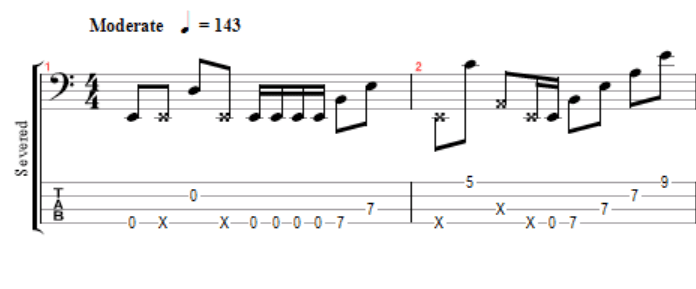
In other words, you can`t get through this song without mastering several intermediate techniques. Thus it serves as a great song to test whether you can play with your fingers, slap, play chords and use slides at a high level.
7. Primus – Tommy The Cat
- BPM: 128
- Genre: Experimental Rock
- Tuning: B Standard
- Bass: 6-string
- Bassist: Les Claypool
If you like quirky, groovy, and complex basslines, try playing some Primus. Les Claypool has also shown us that it is possible to slap a fretless bass, and he is great at incorporating chords into his basslines.
“Tommy The Cat” is among his crazier lines. Here he combines chords, muted notes and hammer-ons, to create this crazy groove:
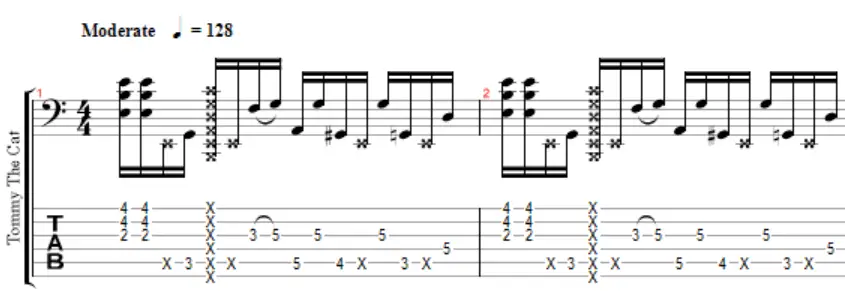
If you have a 6-string, this song is thus a good way to make good use of it. The song will test your ability to play with control at high speeds, and mute strings quickly.
It is thus a helpful song to learn if you are looking to improve your bass playing. After mastering it, you will notice the control you have developed carry over to other songs. If you are able to play it that is.
6. Weather Report – Teen Town
- BPM: 128
- Genre: Jazz Fusion
- Tuning: E Standard
- Bass: 4-string
- Bassist: Jaco Pastorius
No one should be surprised to find Jaco Pastorius on this list.
Jaco is one of the most influential and recognized names among bass players, and one of the all-time greats. He was also a big fan of harmonics and is one of few bassists who incorporated pinch harmonics into their basslines.
The bassline on “Teen Town” feels like just one long bass solo, and a great one at that. While some Motifs are repeated, the song also has a lot of variation to it.

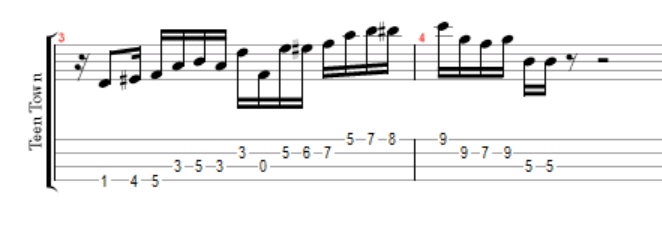
It is incredibly groovy and will test your ability to not come in on the first note of a bar. Also, while there are more technically demanding basslines on this list, this one is among the harder ones to make sound good.
Whether you are familiar with Jaco and his bass of doom or not, I highly recommend giving this song a try. Regardless of what genre you play, he will change how you think about the bass guitar.
5. Coroner – Nosferatu
- BPM: Mainly 200, various slight tempo changes
- Genre: Thrash Metal
- Tuning: E Standard
- Bass: 4-string
- Bassist: Ron Broder
If you are looking for a hard bass tab to test your picking speed, there is no better genre to look in than thrash metal.
“Nosferatu” will not only do this, but it will test your ability to adapt to tempo changes and to play triplets at high speeds.
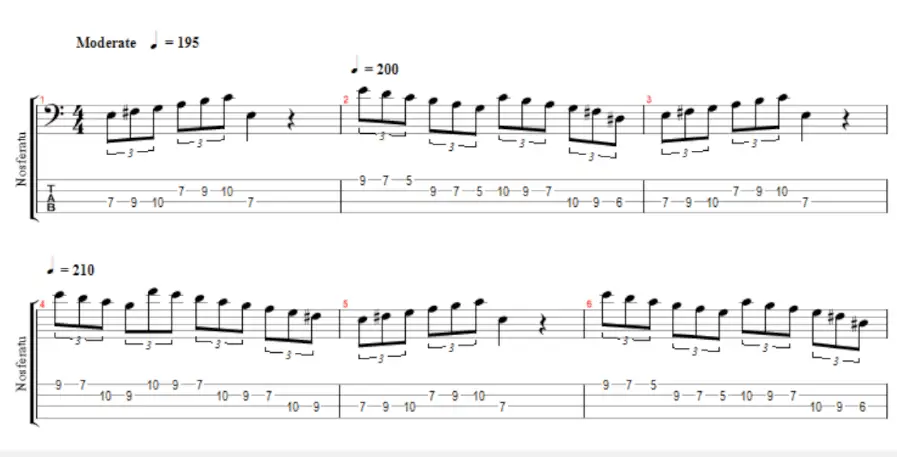

Thus, while the song has some melodic passages that are difficult to fret cleanly, this is mainly a test for your plucking hand.
While this will be easier with a pick, it`s worth noting that Ron Broder plays this song with his fingers. This does however require an intense amount of stamina and the ability to pluck strings fast.
4. Jamiroquai – Don’t Give Hate A Chance
- BPM: 129
- Genre: Funk
- Tuning: E Standard
- Bass: 4-string
- Bassist: Paul Turner
Jamiroquai`s songs are filled with funky basslines. Some of these are relatively straightforward, but you will also find some lines that are hard to pull off.
“Don`t Give Hate A Chance” is one of the songs that are on the harder side. The song kicks off with a bass groove that instantly starts moving all across the fretboard.


How good you can make a funk track like this sound will not just come down to what notes you are playing, but how you play them. This is because the articulation and dynamics of your playing will determine how groovy and danceable the line will feel.
Thus, if you decide to give this song a try, my advice is to record yourself and compare it to the studio version of the song. It doesn`t have to sound identical, but being able to make your playing sound equally groovy is just as important as being able to play the right notes.
3. Rancid – Maxwell Murder
- BPM: 156
- Genre: Punk-Rock
- Tuning: E Standard
- Bass: 4-string
- Bassist: Matt Freeman
Matt Freeman of Rancid made it to the very top of my list of the best punk bass players. This is in large part because he doesn`t shy away from using the bass as a lead instrument.
“Maxwell Murder” in particular is one of the most iconic punk bass songs ever. The main reason for this is Matt`s lively bass solo on it:
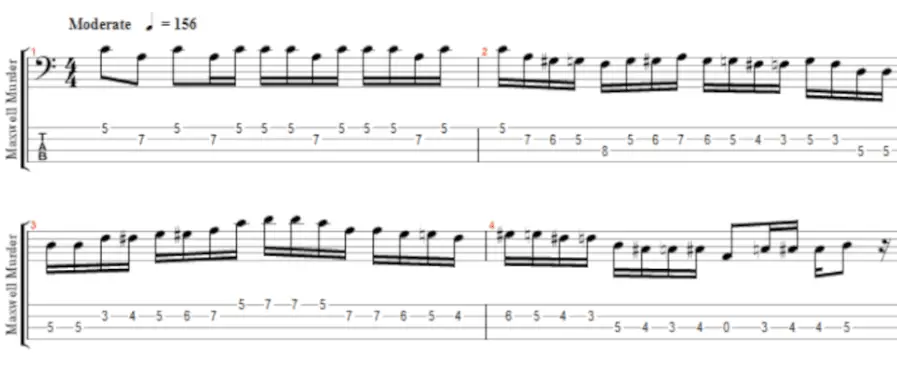
While the rest of the song consists of a fairly simple punk bassline, the bass solo is fast and demanding.
Despite being fairly short, Freeman manages to do a lot in that timeframe. He makes great use of both the minor and chromatic scale to create some finger patterns you won`t find anywhere else. He also moves all across the fretboard, which makes this solo a great challenge for both your left and right hand.
2. Victor Wooten – Classical Thump
- BPM: 132
- Genre: Jazz-Funk
- Tuning: E Standard
- Bass: 4-string
- Bassist: Victor Wooten
If I was forced to answer who the best player of all time is, I`d go with Victor Wooten. Since his come up as a bass player in the 90s he has shown us that he is both extremely skilled and knowledgeable about his instrument.
“Classical Thump” sound beautiful, but it also doubles as a showcase of what he is cable of. It starts slow, then quickly picks up with some incredibly fast slapped triplets.
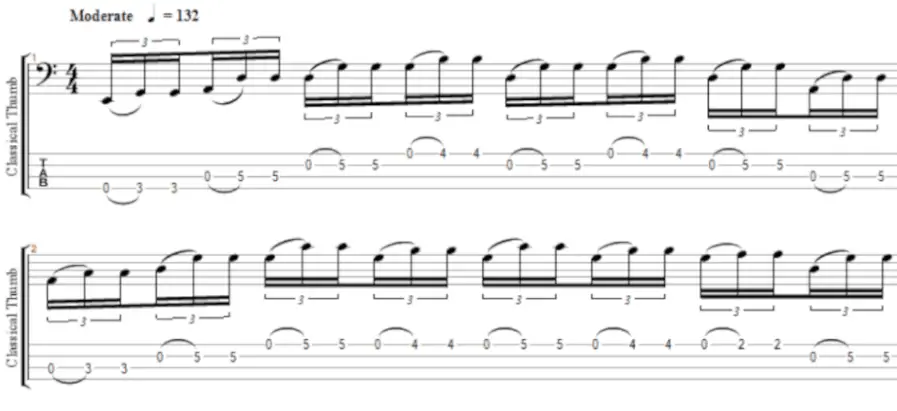
Wooten is able to play some parts of this song by strumming the bass with his thumb. Others are played mainly through slapping and with hammer-ons.
This is perhaps the hardest song on this list to play. If you are able to get through it, you know how good you are.
1. Archspire – Human Murmuration
- BPM: 145
- Genre: Technical Death Metal
- Tuning: B Standard
- Bass: 6-string (Can be played on a 5-string, though some parts will be harder)
- Bassist: Jared Smith (Since 2016)
The only reason Wooten`s song isn`t easily put on top of this list is because of the technical death metal genre. While I and many others like this type of metal, it is understandable why some consider it to be complex for the sake of being complex due to the fast bass lines you will find in this genre.
For a great example of why listen to “Human Murmuration” by Archspire. The first verse consists of a fast 16th note groove at 145 BPM.


While this is hard on its own, it is actually among the easier parts of the song.
Among other things, you will make use of every string and move across the entire fretboard. You will have to tap and play triplets at the same speed. At one point, you even have to tap triplets at the same speed.
If your jaw hasn`t dropped yet, I recommend listening to the song to get an idea of how crazy this actually is.
“Human Murmuration” has given me an inferiority complex more than once, and chances are good that it will do the same to you. If you can actually play the entire thing cleanly, congratulations, you are a much better bassist than most people can even dream of becoming.

